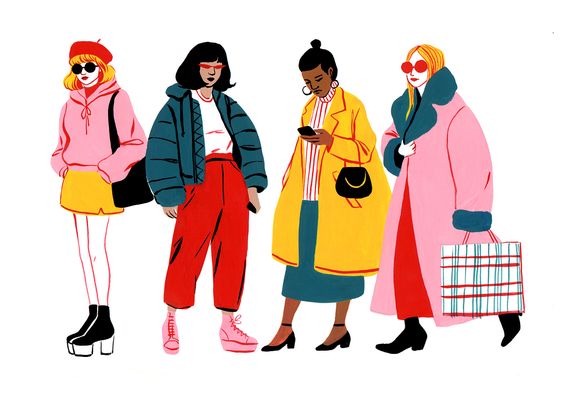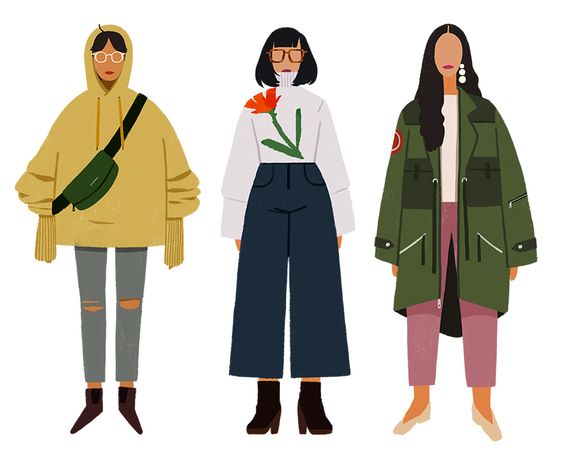
For many years now, market research has been carefully studying Generation Z, observing their behaviours and preferences and discovering that they have a very different relationship with companies than their predecessors. The emerging Millennial vs. Generation Z debate wouldn’t be complete without delving into the fashion industry. But first, here’s a breakdown of the two generation’s.
* Millennials – born between 1981 – 1996
** Generation Z – born between 1996 – 2011
For decades brands have been communicating their “message” through advertisement; hence, corporations with the largest budgets could have consequently had the greatest impacts in magazines, on TV, and billboards. However, with the rise of social media and the internet, Generation Z are really digging deeper into brand philosophy and what they truly stand for, and this goes way beyond the overly photoshopped prints they try to project. It seems that Gen Z are a force to be reckoned with.
For the most part, Gen Z prefer companies that communicate with their customers in an open and transparent manner. Everlane, for example, promotes ethically made fashion, offering insight into how products are being made, the running factories across the globe and the people involved. It is the authenticity and transparency of this information that is so highly valued by the younger generation.
So, how are Generation Z getting it so right?
Some would argue that Millennials are the generation that gave rise to the fast-fashion problem. This is true, as when once the economy was thriving and healthy, Millennials would spend their hard-earned cash on brands such as Forever 21, H&M and Zara (to name a few), thus fueling our retail pollution. The difference between the two generations in this day in age is that the teens of today are less interested in big brands, and even their loyalty to those brands seems to be non-existent. According to American Eagle Outfitters, Gen Z aren’t spending as much as their predecessors, and are consequently less brand-conscious. Likewise, if a brand appears to better match their values and morals regarding sustainability and the environment, then they are more likely to switch to that brand, even if it comes with a price.
Millennials are apt to dress in a way they believe would help them to succeed within the workplace (think conventional, clean-cut shirts, mid-length skirt). Research shows that Gen Z take a different approach, valuing comfort and function over looking the part. They believe that everyone should have the freedom to throw on outfits that make them feel comfortable and relaxed all day long. After all, what is the point of looking great if you’re not feeling it? Hello oversized shirts, good-bye skin tight dresses.

Generation Z strives for individuality; the on-the-go digital cohort are adept at sharing and revealing their lives on social media, and across platforms such as Instagram and Youtube. Steering away from the big brands and seeking their own individuality go hand in hand, Gen Zer’s are effortless in their approach to making casual look cool and expects brands to represent a credible view of how people wear real clothes. The power of social media has Gen z tuning in to their relatable influencers (if not their peers) when deciding what clothes to buy, and definitely not looking at models in magazines.
In other words, embracing diversity and supporting conscientious processes such as sustainable manufacturing and ethical supply chains are key to keeping Gen Z happy customers.
It seems like Generation Z are ticking all the boxes when it comes to gearing their beliefs towards a more sustainable fashion future, but one question on my mind is how are the youth of today able to afford the sustainable brands that come with a hefty price tag?
Well, it’s quite simple, it seems they are doing a great job at avoiding the pitfalls Millennials walked straight into. Gen Z are careful spenders: they don’t just stand out in terms of how they relate to the fashion industry, but also by spending differently. Reports show they are saving far earlier than older generations; 60% already having a savings accounts and 71% claiming they are more focused on saving for their future.
It seems to me that they are financially cautious and kudos to them!
To sum, it is clear that the current and generations to follow will continue to change the global business landscape through greater consumer activism than their older cohort, Millennials. It is inspiring to see that together people really can make a positive change towards a brighter, more sustainable future.
Please comment below with your favourite sustainable brands, I would love to check them out!




